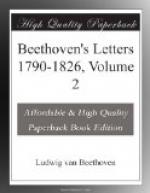English language, Beethoven’s correspondence in the.
Erdoedy Countess, in Vienna, one of Beethoven’s best friends.
Ertmann, Baroness Dorothea (nee Graumann), a friend of Beethoven, and one of the most accomplished pianists in Vienna; she especially excelled in the performance of Beethoven’s compositions.
Esterhazy, Prince Paul, son of the protector of Haydn, and himself, at a later period, an ardent admirer of that master.
France.
Frank, Dr.
Frank, Frau, in Vienna.
“Frau Schnaps,” Beethoven’s housekeeper during the latter years of his life; called also “The Fast-sailing Frigate” and “The Old Goose.”
French language, Beethoven’s correspondence in the.
Fries, Count, in Vienna, an admirer of Beethoven’s works.
Fux, the well-known old theorist and composer, in
Vienna, author of the
“Gradus ad Parnassum.”
Gallizin, Prince Nikolaus Boris, at St. Petersburg, a zealous friend of art, from whom Beethoven received an order for his last quartet.
Gebauer, Franz Xaver, founder of the “Concerts Spirituels” at Vienna.
Gerardi, Mdlle.
Girowetz, Court musical director at the “Burgtheater.”
Giuliani, a celebrated guitar player at Vienna.
Glaeser, Beethoven’s copyist from the year 1823.
Gleichenstein, Baron, of Rothweil, near Freiburg in Breisgau, a friend of Beethoven at Vienna. He left Vienna about the year 1815, and only revisited that city once afterwards, in 1824.
Gneixendorf, the estate of Beethoven’s brother Johann, near Krems, on the Danube, which Beethoven visited, accompanied by his nephew, in the autumn of 1826.
Goethe.
Gratz, in Styria.
Grillparzer.
Guicciardi, Countess Giulietta, Beethoven’s “immortal beloved.”
Hammer-Purgstall, the distinguished Orientalist in Vienna.
Handel.
Haslinger, Tobias, music publisher at Vienna.
Hauschka, Vincenz, Government auditor, a friend of Beethoven.
Heiligenstadt, near Vienna, a favorite summer residence of Beethoven, where, among other works, the “Pastoral Symphony” was written by him.
Hetzendorf, a favorite suburban residence near Vienna.
Hoffmann, Th. Amadeus.
Hofmeister, Kapellmeister and music publisher, first in Vienna, and afterwards in company with Kuehnel in Leipzig (now Peters’s Bureau de Musique). See also Peters.
Holz, Carl, Government official at Vienna, an accomplished violinist, born in 1798; became a member of the Schuppanzigh Quartets in 1824, and afterwards director of the Concerts Spirituels in that capital; a Viennese of somewhat dissolute habits, by whom even the grave master himself was at times unfavorably influenced.
Homer, especially the Odyssey, a favorite study of Beethoven.
Hoenigstein, a banker in Vienna.




